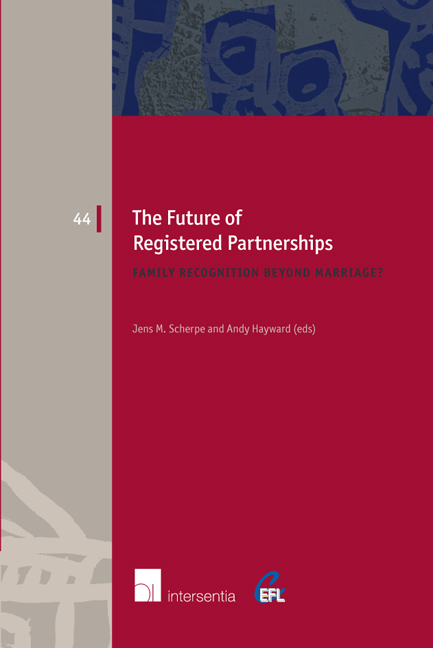Book contents
- Frontmatter
- Foreword
- Preface
- Contents
- List of Contributors
- The Future of Registered Partnerships: An Introduction
- Questionnaire
- Part I Registered Partnerships as a Functional Equivalent to Marriage
- Registered Partnerships in Denmark
- Registered Partnerships in Norway
- Registered Partnerships in Sweden
- Registered Partnerships in Iceland
- Part II Registered Partnerships as an Alternative to Marriage
- Part III Registered Partnerships in a Time of Transition
- Part IV Alternative Models for Registered Partnerships: Beyond Conjugality, Beyond Formality
- Part V Registered Partnerships, Discrimination and Human Rights
- Part VI Comparative Perspective and Conclusions
- Index
- European Family Law Series
Registered Partnerships in Norway
from Part I - Registered Partnerships as a Functional Equivalent to Marriage
Published online by Cambridge University Press: 22 September 2018
- Frontmatter
- Foreword
- Preface
- Contents
- List of Contributors
- The Future of Registered Partnerships: An Introduction
- Questionnaire
- Part I Registered Partnerships as a Functional Equivalent to Marriage
- Registered Partnerships in Denmark
- Registered Partnerships in Norway
- Registered Partnerships in Sweden
- Registered Partnerships in Iceland
- Part II Registered Partnerships as an Alternative to Marriage
- Part III Registered Partnerships in a Time of Transition
- Part IV Alternative Models for Registered Partnerships: Beyond Conjugality, Beyond Formality
- Part V Registered Partnerships, Discrimination and Human Rights
- Part VI Comparative Perspective and Conclusions
- Index
- European Family Law Series
Summary
HISTORY AND BACKGROUND
BASIC STRUCTURES OF THE LAW ON ADULT RELATIONSHIPS
In Norway adult relationships that can bring with them legal consequences can be divided into three categories: marriage, registered partnerships and unmarried adults belonging to the same household (in Norwegian: husstandsfellesskap). However, since 1 January 2009 it has no longer been possible to register partnerships. On this date the Registered Partnership Act, which had entered into force on 1 August 1993, was repealed, and the amended § 1 of the Marriage Act 2 came into force, stating that two persons of opposite or the same sex may enter into marriage. Since then existing registered partnerships can (but do not have to) be transformed into a marriage upon the partners’ request.
In practice the legal consequences of having registered a partnership are the same as of contracting a marriage. Statutory provisions relating to marriage will be interpreted and applied as including registered partners, even if it is not expressly stated in the individual provision or act, as for example in the Marriage Act.
The Marriage Act regulates entering into and dissolving a marriage. It also states that both spouses have a duty to maintain the other as long as they live together. Furthermore, it regulates property relations between spouses, including responsibility for debts, (pre)nuptial agreements, gift s, and the division of property upon divorce or the death of a spouse. There are also provisions regarding maintenance claims and pension rights after divorce. Other legal consequences of a marriage are regulated elsewhere, e.g. in the Inheritance Act and the Adoption Act.
There is no comparable comprehensive Act regarding unmarried adults belonging to the same household, a category which mainly consists of, but is not restricted to, cohabitants. The law of cohabitation consists of a few statutory provisions and non-statutory rules and principles regarding some aspects of cohabitation, in private law in particular regarding property following the dissolution of the relationship and inheritance rights.
MOTIVES FOR INTRODUCTION OF REGISTERED PARTNERSHIPS
Marriage between homosexuals and legislation for homosexual relationships had been topics already in the early 1970s, especially in the gay movement. Marriage was nevertheless rejected in 1973 by Det Norske Forbund av 1948 (DNF-48, the Norwegian Association of 1948) which at that time was the only organisation for homosexuals. The main reason was that the organisation would not accept any form of discrimination of single people.
- Type
- Chapter
- Information
- The Future of Registered PartnershipsFamily Recognition Beyond Marriage?, pp. 43 - 70Publisher: IntersentiaPrint publication year: 2017

